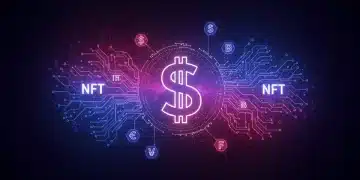How smart contracts automate transactions and simplify life

Smart contracts automate transactions by executing self-enforcing agreements based on conditions coded on a blockchain, enhancing security, efficiency, and transparency in various industries.
How smart contracts automate transactions offers a glimpse into a world where efficiency meets transparency. Ever thought about how these digital agreements could transform industries? Let’s dive into the wonders they bring!
Understanding smart contracts
Understanding smart contracts is essential in today’s digital landscape. These self-executing contracts leverage blockchain technology to automate processes, ensuring transparency and trust.
This automated nature not only reduces human error but also significantly speeds up transactions. To grasp how they work, let’s break it down into fundamental concepts.
What Are Smart Contracts?
Smart contracts are basically computer programs that automatically execute when specific conditions are met. They are stored and executed on a blockchain, ensuring that transactions are secure and tamper-proof. Smart contracts use clear scripts to define rules and obligations, which all parties can verify, leading to greater trust.
Key Features of Smart Contracts
- Automation: Eliminates the need for intermediaries.
- Security: Utilizes cryptography to secure transactions.
- Transparency: All transactions are recorded on the blockchain, accessible to all parties.
- Cost-Effectiveness: Reduces costs associated with traditional contract enforcement.
The impact of smart contracts extends beyond mere automation. They enable complex transactions across various industries, such as finance, healthcare, and real estate, streamlining operations, and enhancing efficiency. For instance, in real estate, smart contracts can simplify the process of purchasing and selling properties. Once the sale conditions are met, the contract triggers the transfer of ownership instantly, which is not only faster but also reduces the chances of disputes.
Additionally, smart contracts can be programmed to handle various scenarios. Whether it involves multiple parties in a transaction or conditional payments, these contracts offer flexibility while remaining secure.
Benefits of smart contracts for businesses

Benefits of smart contracts for businesses are numerous and transformative. They allow companies to optimize processes and minimize risks, all while saving valuable resources.
One of the primary advantages is cost reduction. By automating tasks, businesses can eliminate the need for intermediaries, such as lawyers and notaries, which significantly cuts down on expenses.
Increased Efficiency
Smart contracts execute automatically when predetermined conditions are met. This speed improves workflows, reducing delays associated with traditional contract processes. Businesses can react faster to market changes and decisions.
Enhanced Security
Security is another critical feature. Smart contracts utilize blockchain technology, making them nearly impossible to alter. This cryptographic protection ensures the integrity of agreements and minimizes the risk of fraud.
- Data Accuracy: As less human input is involved, the risk of errors is dramatically lowered.
- Transparency: All parties can view contract terms, reducing misunderstandings.
- Trust Building: Transparency and security foster trust among stakeholders.
Moreover, these contracts offer remarkable flexibility. Companies can tailor smart contracts to meet their specific needs and criteria, providing a customized solution for various transactions. Whether in finance, real estate, or supply chain management, the adaptability of smart contracts caters to diverse business scenarios.
As these benefits demonstrate, embracing smart contracts can give businesses a competitive edge. The combination of efficiency, security, and cost savings drives companies to innovate their practices and enhance customer satisfaction.
How smart contracts enhance transaction security
How smart contracts enhance transaction security is a crucial aspect for businesses and individuals alike. These contracts eliminate many traditional security risks, offering a more reliable way to conduct transactions.
The foundation of smart contracts lies in blockchain technology, which records transactions in an immutable manner. This means that once a transaction occurs, it cannot be changed or tampered with, creating a high level of security.
Cryptographic Security
Smart contracts use advanced cryptographic techniques to protect data. This includes encryption, which ensures that only the intended parties can access the contract’s details. Such measures significantly reduce the chances of fraud and unauthorized access.
Automatic Execution
Another layer of security comes from the automatic execution of contracts. When terms and conditions are met, the contract executes itself without the need for human intervention. This eliminates the potential for human error, ensuring that all transactions are carried out as intended.
- Reduced Risk of Disputes: Clear terms are embedded in the contract, making misunderstandings less likely.
- Audit Trails: Each transaction is recorded on the blockchain, providing a reliable record for verification.
- Decentralization: Eliminates the reliance on centralized authorities, which can be prone to manipulation.
Moreover, smart contracts can be programmed with complex logic, setting up protocols that help identify and prevent fraudulent activities. This flexibility in smart contract design allows businesses to tailor their security measures according to their specific needs, further enhancing transaction safety.
As companies increasingly adopt smart contracts, the enhanced security features will be pivotal in building trust among users. This not only protects sensitive data but also promotes a safer digital economy.
The future of automation with smart contracts

The future of automation with smart contracts holds exciting potential for various industries. As technology evolves, these contracts will play a key role in shaping the way businesses operate.
Smart contracts are expected to evolve in complexity and functionality. With advancements in artificial intelligence and machine learning, these contracts will become even more intuitive. This means businesses can automate increasingly sophisticated processes, reducing manual oversight.
Streamlined Operations
In the future, we can expect smart contracts to streamline operations significantly. They will automate not just simple tasks but also complex workflows that involve multiple stakeholders. This capability will enhance collaboration among parties, making transactions smoother.
Decentralized Applications
Moreover, the integration of smart contracts with decentralized applications (dApps) will transform how industries function. For example, in finance, smart contracts can automate loans and insurance claims, reducing the time and effort needed to process these transactions.
- Improved Customer Experience: Faster transactions will lead to higher customer satisfaction.
- Cost Savings: Reduced operational costs will allow businesses to allocate resources more effectively.
- Scalability: Businesses can expand more easily with automated processes in place.
As more sectors adopt this technology, we will likely see a shift toward greater use of smart contracts in daily transactions. This adoption will encourage innovation, allowing businesses to rethink their operations and develop new models that leverage automation effectively.
The future prospects are bright, offering opportunities for efficiency and security that will redefine the business landscape.
FAQ – Frequently Asked Questions about Smart Contracts
What are smart contracts?
Smart contracts are self-executing contracts with the terms directly written into code on a blockchain, automatically executing when predetermined conditions are met.
How do smart contracts enhance security?
They enhance security by using blockchain technology, which ensures that once a contract is executed, it cannot be altered, reducing the risk of fraud.
What are the benefits of using smart contracts in business?
Smart contracts reduce costs, increase efficiency, and improve transaction speed by automating processes and eliminating intermediaries.
What is the future of automation with smart contracts?
The future of automation with smart contracts includes more complex functionalities, enabling businesses to streamline operations and improve collaborative workflows.





